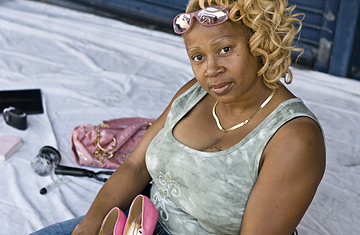
California fires
Imagine getting a knock on the door in the middle of the night. You have 10 minutes to leave, says the sheriff's deputy, and you don't doubt him. The air is suddenly so turbid that your daughter, who has asthma, is throwing up in the hall bathroom. Ash is gathering like snow on the front steps. You close the door and consider the question that is becoming an existential ritual for hundreds of thousands of people around the world every year: What do I take?
What do I take, after the photo albums, the inhaler and the important papers? Then what? In California the other day, Ava Raich packed the younger kids' special blankets, her grandfather's World War II Marine uniform and his Purple Heart, she told the Los Angeles Times. Diane Doroski fled with an antique toy carousel and her great-grandmother's butter dish. Butch Rey took his wife, three children and two parents. His sons took all their autographed baseballs and their PlayStation 2, Agence France-Presse reported.
The word evacuation doesn't do justice to the poignancy of the act. An evacuation is--potentially--the willful and reasonable abandonment of a life. Not just the photographs but also your grandfather's ashes and your baby's receiving blanket from the hospital. Until they're gone, it's easy to tell yourself those things don't matter. Then material things become a proxy for all the nonmaterial things you lost too. Peace of mind, say, or a sense of where you came from. Or an identity as someone who gives handouts and doesn't take them.
Now that disasters are becoming more frequent and more destructive, entire populations are becoming experts in this calculus. Since Hurricane Katrina, people on the Gulf Coast maintain the smartest evacuation packs you will find anywhere: ruthlessly compact, wildly creative. They keep documents sealed in floatable boxes; they have coffee tables that turn into trunks and garbage cans that turn into latrines; they have learned that the only thing more valuable than a hand-crank radio is a hand-crank TV.
In 2006 the New Orleans Times-Picayune asked people to write in their advice for future evacuations. Their responses read like poetry, and you won't find most of them on any Red Cross checklist: my own pillow, Sudoku, shoes other than flip-flops, solar-powered garden lights, cat litter (for the humans), the kids' immunization records, the good bottles of wine we were saving for special occasions, and Xanax.
People wrote about the lessons they will carry in their heads. The kind of advice that doesn't fit in a suitcase but will almost certainly matter more than Band-Aids: Learn how to text-message, do not let your kids watch TV news, and never depend on the government. And "as you drive away from a house and possessions you may never enjoy again," wrote a survivor, "remember the song about how you can't drag a U-Haul behind your hearse."
Over the years, I have written about dozens of disasters as a reporter. Mostly because I would be embarrassed if I didn't, I keep an evacuation backpack stashed deep in the hall closet. But the truth is, I've never been satisfied with the concept. Yes, I think everyone has a responsibility to have three days of water and food, plus extra medications, if possible. But there is something wrong with those lists. They are too long and too short at the same time.
After Hurricane Katrina, John Sorensen and his wife Barbara Vogt Sorensen, both experts in disaster preparedness, went to Wal-Mart to conduct an experiment. They divided up the emergency-supplies list that FEMA had published, then started shopping. It took them 2 1/2 hours. It cost $343 for a family of two. Theoretically, a good number of the items would need to be replenished every six to 12 months. "A family that lives from check to check can't afford to do that. It was a real eye-opener," says John, who, with his wife, works at Oak Ridge National Laboratory in Tennessee. He piled everything into a huge duffel bag, and his wife couldn't lift it. "I think there is a need for prioritization," he says.
Personally, I've come to think that the smartest thing to do is to keep a small bag of recommended provisions, plus a list--which you would make yourself and update every year or so. The list would be short enough so that you could gather everything up in 10 minutes. If nothing else, making the list would be an interesting exercise. Like making a time capsule that never gets buried. Unless, of course, Mount Vesuvius erupts. In that case, if you have had time to pack your bag, it might be something for the archaeologists to unearth. They would puzzle over the PlayStation 2 and the butter dish and wonder what it said about who you were--and what you most feared losing.
